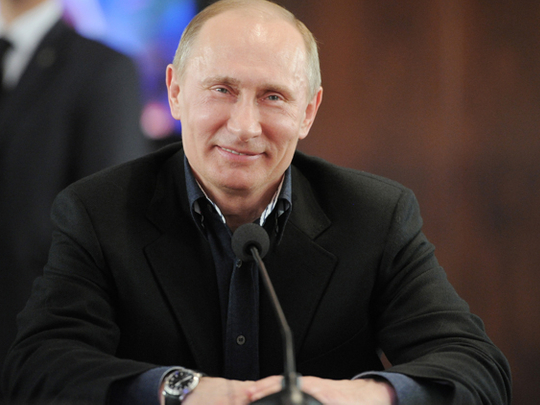
The election of the once and future president of the Russian federation, Vladimir Putin, tempts one to despair that the brief and inspiring political awakening in Russia over the past year was for naught.
Putin has gotten his way — replacing his protege Dmitry Medvedev and reclaiming the Kremlin to solidify authoritarianism and political stagnation. But this victory may be both Putin's last and the final one for Putinism. The future turns on the behaviour of a rising Russian middle class that is integrated into the world and alienated by the Kremlin's corrupt politics.
I first went to the Soviet Union in 1979 as a graduate student. I was immediately struck by how Soviet citizens walked along — looking at their feet. This was a frightened and cowed population, many of whom remembered firsthand the oppression and violence of Stalinism. Repression casts a long historical shadow.
When Putin took office, he re-stablished the arbitrary power of the state — destroying the independence of the judiciary; appointing governors rather than voters electing them; and all but closing down independent television. Several journalists who challenged the authorities — such as Anna Politkovskaya — paid the ultimate price for doing so. But Soviet-style repression it wasn't — neither in its brutality nor its reach into the general population.
Few now remember those darker days. Moreover, while television became the Kremlin's mouthpiece, the internet flourished as a place where alternative voices were heard.
At a meeting with young entrepreneurs during a visit to Moscow as secretary of state in 2007, I voiced concern about the absence of independent media. One young man stopped me, saying, "Who watches television? We're all on the internet."
Different expectations
He might have added that all of them had worked outside Russia — in global law, consulting and accounting firms. More than half of them had studied abroad in prestigious business schools in Europe and the US.
These young people are a relatively small percentage of Russia's population. But look around Moscow, St Petersburg or even Vladivostok: There is a burgeoning urban middle class who own their apartments, furnish them at Ikea and spoil their children at McDonald's. They, too, have become accustomed to normal lives and have different expectations for the future.
Putin has staked his legitimacy on prosperity and order, but he seemed not to understand that a prosperous population would demand respect, too. In declaring that he would be president again and then engaging in election fraud during the December parliamentary voting, he insulted the Russian people. Many are fed up with a political system that sometimes behaves more like a natural resources syndicate than a national government.
It is not yet clear whether change will be revolutionary or evolutionary. If the powers that be read the lessons of the past year and make even modest reforms, they might give their people a great gift, one that knows no antecedent in Russian history: peaceful change. If they do not, conflict is inevitable. And Russia's experience with revolution is not pretty.
Much depends on who capitalises on the thirst for change. As daily protests wane, the hard work of political organising must begin. In this regard, the liberal, or ‘right', forces (as they are known) need to address the Russian people's concrete economic and social concerns.
Opportunity for liberals
This time the liberals have a ready-made constituency in the rising middle class and its youthful vanguard. They cannot waste this opportunity. Otherwise, the standard-bearers of change could be radical nationalists, even warmed-over communists who might well tap into the growing dissatisfaction but replace it with xenophobia and, ultimately, a rejection of democratic principles.
Does the US have any influence in the outcome? Some, though not much. Certainly, it should speak even louder for respect for human rights and the rule of law. Undoubtedly, lower oil prices would rob the Kremlin of the easy money that fuels corruption, personal fortunes and authoritarianism.
This is yet another compelling argument for developing North America's significant sources of energy. A Russia that fully develops its human capital, not just its resources in the ground, has the potential to make a real contribution to a more prosperous world.
For centuries Russia's great-power status has largely rested on military might, natural resources, intimidation of its neighbours and suspicion of the outside world. US foreign policy — ‘reset' or not — has not changed that reality because its foundation has been the character of Russia's internal politics.
How refreshing it would be if the Kremlin's power were based on the creativity of its people. A new generation of Russians has loudly voiced its insistence on respect from those who would govern — perhaps even demanding that they consent to be governed. The US has a stake in their success and an obligation to help them achieve it.
— Washington Post
Condoleezza Rice was US secretary of state from 2005 to 2009.










